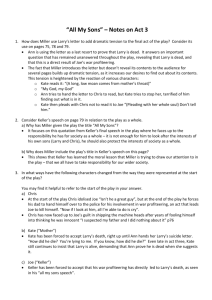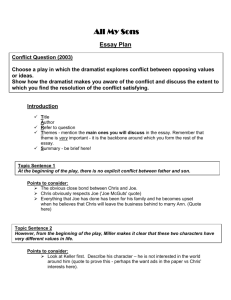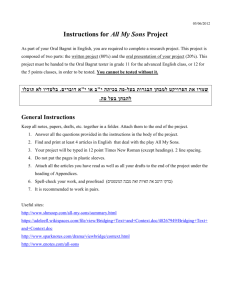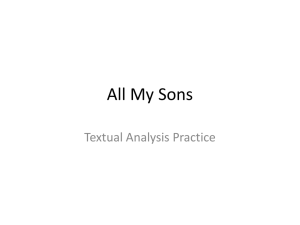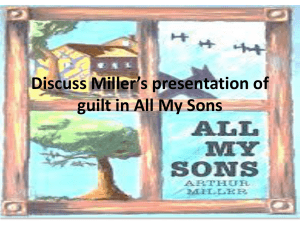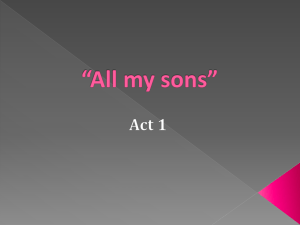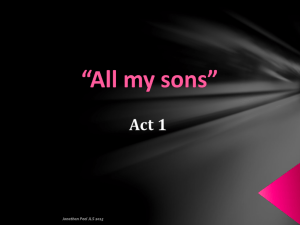All My Sons - WordPress.com
advertisement
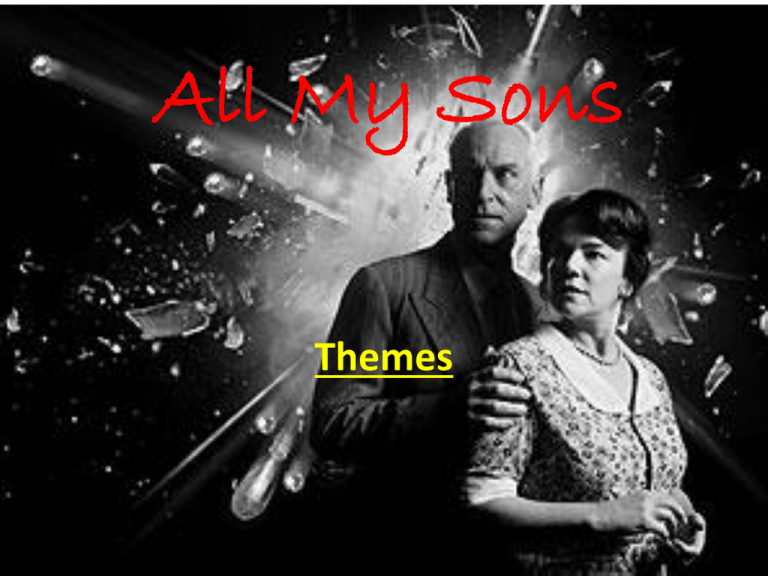
All My Sons Themes The American Dream • The American Dream is a concept which is difficult to define, but generally means the belief that all Americans, regardless of social class, education or status have the right and ability to achieve a comfortable life and financial security. • Americans living after the Great Depression (which started in 1929 and ran through most of the 1930s) needed to cling onto this ideal. ‘All My Sons’ was written in 1947. The American Dream • ‘All My Sons’ analyses the fragility of the American Dream. The play exposes it as an illusion, unattainable to the majority, even to those who appear to have achieved it. • On the surface, Joe Keller has achieved his portion of the American Dream: he is uneducated, but as a hard worker he has managed to become a successful factory boss and owner. He has a nice house and garden; his family are loving and he is well liked in the community. • Joe made a lot of his money during the war and his drive to achieve the American Dream results in him being responsible for the deaths of twenty-one pilots. • Joe’s family is not perfect either: his wife denies that her son is dead; believing that if he is then Joe would be responsible for it. When Joe discovers that Larry killed himself because of his father’s negligence, he finally realises that the responsibility of the deaths of all these young men lies with him.: he killed all his sons. Social Responsibility • Social responsibility is the duty of an individual to the society in which they live. • This is a central theme in ‘All My Sons’, and a relevant one as the play was written so soon after the war: many people had given their lives in the service of their society, which they passionately believed to be moral. Keller’s actions are in direct contradiction to such selfless dedication. • It is ironic that the ones who suffer from Keller’s selfish actions are those who are risking their lives to help others. Social Responsibility 1. In what ways have Joe Keller and Steve Deever violated their social responsibilities? 2. What has Keller done which makes his negligence of his social responsibilities even worse? 3. Keller is very calculated in his deception regarding his crime. Notice how he speaks about Steve: he belittles him and shows himself in a favourable light. In ‘explaining’ Steve’s actions, what is he also trying to do? 4. Keller describes himself as “bigger than ever” (pp. 28) and Steve as “a little man”(pp. 31). What does he mean by this? Social Responsibility Keller only truly admits his guilt when he realises that he was directly responsible for his son’s death, rather than just symbolically responsible. Previously, he viewed the personal benefit to his family as outweighing the hurt done to society. Larry’s death finally shows him that he cannot view his family as separate from the society in which they live. Larry’s death is a synecdoche for all the pilots killed by the cylinder heads: the Keller family is equally a smaller unit in a larger society, not a separate entity. Social Responsibility There are others in the play who have also broken the rules of the community: • Steve relied on Keller to make the crucial decision, instead of listening to his instincts as a machinist. • Kate is complicit in her husband’s deception. However, although she must live with her remorse over the deaths of her son and husband, her tenderness towards Chris at the end of the play implies that she will achieve some redemption. • Jim and Sue Bayliss continue to be friendly with him, even though they know his version of the shipment incident is untruthful. • The wider community have also chosen the easy road and failed to confront Keller. War • While Chris and George were deeply affected by their experiences in the war, and are no longer comfortable in their old lives, the play shows that it had a devastating effect on society as a whole, not just on those who served in the military. Kate and Ann represent two contrasting examples of how people coped with the loss of loved ones during the war: • Kate chooses to realign her whole worldview around Larry’s death (pp. 26). For her, Larry’s continued existence justifies the existence of God, while God’s existence proves that Larry could not have been killed. The war has shaped her fundamental convictions. • Ann does not try to deny her loss, and her greatest struggle is not if, but how she will move on from this. She chooses to cope with the tumult the war brought about by re-establishing a connection with those she was close to in her youth. The war has brought out traits in the characters that were hidden before: Keller’s lack of consideration for those outside of his own family; Ann’s innate strength and independence and Kate’s controlling nature. Wartime Profiteering Joe Keller’s success comes from this: a fact that Arthur Miller found abhorrent and is reflected in Chris’s condemnation at the end of the play. Chris is horrified when he realises that his father is responsible for so much grief and suffering, and even more so when Joe tries to claim that he did it for him; to secure the business for Chris and to ensure a good inheritance. The play is an attack on human selfishness and materialism. Miller shows that human life is much more important than money; each person should treat others as equals and not expendable objects, even if they are not directly related to them. Denial All the characters are in denial of the truth in some form or other, but the two most affected by this are: • Joe Keller denies his guilt and believes he has achieved the American Dream. • Kate Keller refuses to believe that Larry is dead. In doing this she has convinced herself of Joe’s innocence and believes Larry will come home. If untrue, this would mean that Joe has killed his own son. Perhaps Miller’s most poignant message in the play is that a wrong committed in the past is inescapable, and must eventually be rectified. Kate and Joe are punished for their prolonged attempts to deny what has happened in the past. Keller’s death is rather ambiguous. His punishment is absolute: he pays for the deaths of others with his own life. However, he escapes the outrage of his community and the humiliation of jail. Disillusionment If someone becomes disillusioned, they have lost belief in their illusions or ideals. Chris has to deal most with this in the play, although there are some insightful comments from both Sue and Jim Bayliss too. 1. Write a paragraph about what Chris’s ideals and illusions were about life, and how they have been broken in the play. 2. Look through your quotation booklet and find some insightful quotations which deal with this theme. You will find these in the sections for Chris, Sue Bayliss and Jim Bayliss.
